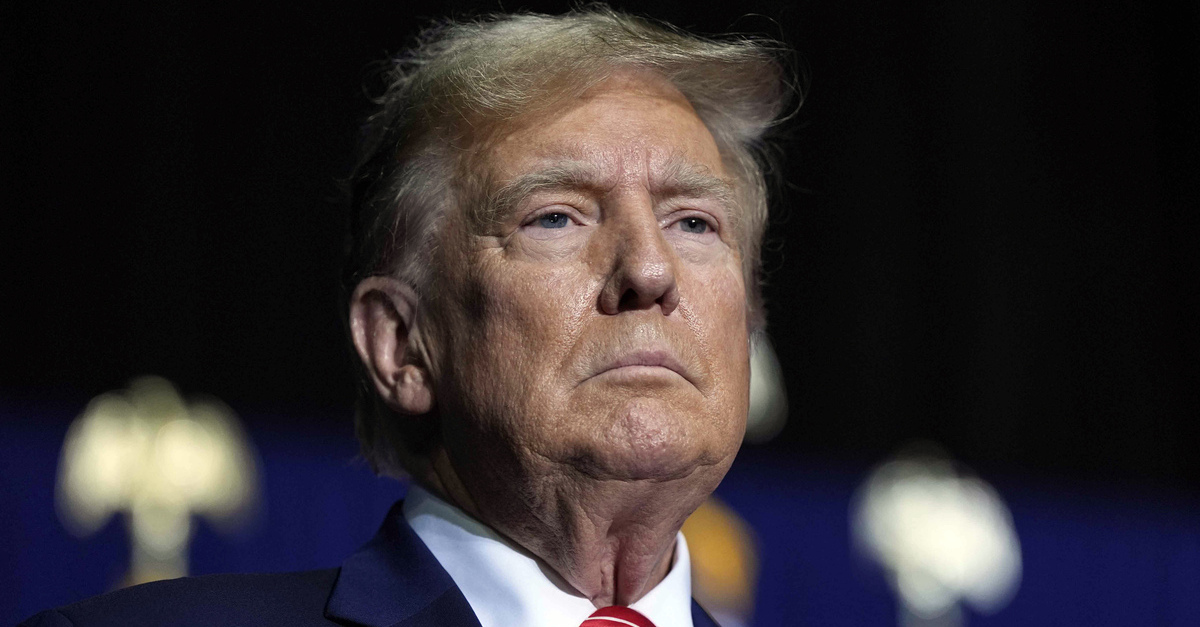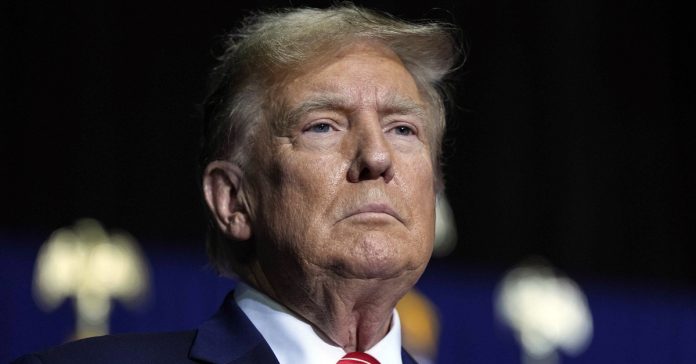
FILE – Republican presidential candidate former President Donald Trump speaks at a campaign rally, March 9, 2024, in Rome Ga. Lawyers for former President Donald Trump argued in a court filing that the charges against him in the Georgia election interference case seek to criminalize political speech and advocacy conduct that is protected by the First Amendment. (AP Photo/Mike Stewart, File)
Former President Donald Trump is being unlawfully prosecuted in Georgia for political speech that is protected by the First Amendment to the U.S. Constitution, a defense attorney argued on Thursday.
During a motions hearing in Fulton County Superior Court, Atlanta-based lawyer Steve Sadow argued that conspiracy charges against his client should be dismissed because they run afoul of U.S. Supreme Court precedent protecting specifically falsehoods and lies.
In the sprawling, 98-page, 41-count criminal indictment filed by Fulton County prosecutors against Trump and others in August 2023, several conspiracy counts allege conduct that includes fraud.
Trump’s defense says the allegations of fraud don’t hold up to legal scrutiny because they are back-engineered to reach a preordained conclusion — and are based on disallowed criminalization of speech.
“The only thing that makes it fraudulent is the state saying it’s false,” the 45th president’s lead attorney told Judge Scott McAfee on Thursday. “The only reason it becomes unprotected, in the state’s opinion, is because they call it false.”
In motions filed earlier this year, Sadow sketched out the arguments which received significant exposition during the hearing.
One defense motion argues that some of Trump’s infamous 2021 requests to Georgia Secretary of State Brad Raffensperger “are plainly protected by the First Amendment, and cannot plausibly form the basis of any prosecution of President Trump.”
“Importantly, the alleged criminal conduct underlying this indictment consists entirely of core political speech at the zenith of First Amendment protections,” another defense motion argues. “President Trump is the first person to face criminal charges for such core political behavior.”
During the hearing, the defense categorized many of Trump’s activities in relation to the 2020 presidential election as “the height of political speech” and said prosecutors’ efforts to use words like “unlawful” in charging documents simply cannot erase that.
Sadow quoted, at length, the following passage from a Justice Samuel Alito dissent in a landmark First Amendment case:
Even where there is a wide scholarly consensus concerning a particular matter, the truth is served by allowing that consensus to be challenged without fear of reprisal. Today’s accepted wisdom sometimes turns out to be mistaken. And in these contexts, “[e]ven a false statement may be deemed to make a valuable contribution to public debate, since it brings about ‘the clearer perception and livelier impression of truth, produced by its collision with error.’”
“That’s the essence of what we have right here,” Sadow said. “That’s the facts that have been alleged. Essentially, the state’s position is: because, as alleged, what President Trump said, speech wise, or expressed either through his speech or his conduct, which is still freedom of expression, because that’s false, in the eyes of the state, it’s lost all protections of the First Amendment.”
“If anything, under the circumstances, it needs more protection, not less protection,” Sadow continued.
The defense categorized the state’s position on the conspiracy counts as conclusory arguments: that mere allegations of fraud are enough to sustain the charges based on the speech and expression at issue. Trump’s attorney sharply disagreed with this understanding of the law.
“You must look at the speech itself,” Sadow said. “You must look at the expressive conduct itself in connection with those specific statutes … You want to look and see why under the circumstances here, the language, speech, of the president, falls within that. And if you look at it in that sense, the mere fact that it’s false is all that they have.”
The heart of the defense’s free speech as-applied challenge is that Fulton County prosecutors put the cart before the horse by operating on the assumption that Trump was trying to do something illegal in the first place and then used his undisputed speech to try and prove it.
“What the state wants to do is say, ‘We have a goal, we have an objective here that we put forward: steal the election in an unlawful fashion,”” Sadow said. “I say change that for a second to: legitimate concern about the validity of the election. If that was the way you focused on it — which is a way to do it as-applied, even with the facts — would what president Trump said on those counts be a protected speech? The answer is: It has to be.”
The defense also moved to dismiss other counts in the indictment because they are based on Georgia laws which purport to criminalize making false statements under certain circumstances — without any materiality component. Sadow said those particular statutes, when being applied to “political discourse,” are clearly unconstitutional.
Trump’s attorney said many of the overt acts in the racketeering (RICO) charge is a closer call but insisted the “essence” of First Amendment law in the United States protects political speech.
“There is nothing alleged factually against president Trump that is not political speech,” Sadow told the court. “Take out the political speech, no criminal charges. Political speech disagreed with — basis for all charges.”
The state, for its part, insisted Trump was not being prosecuted for his speech — or even the falsity of his speech — alone.
“The mere fact that you’re talking about issues of public concern or core political speech, which may be completely fine and protected in certain — in most contexts — does not mean you cannot be indicted if you use that kind of speech to pursue illegal activities,” prosecutor Donald Wakeford told the court. “This speech, this expression, all this activity is employed as part of a pattern of criminal conduct.”
Have a tip we should know? [email protected]

